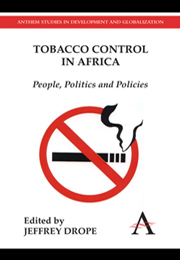Book contents
- Frontmatter
- Contents
- List of Figures and Tables
- Foreword
- Preface
- Acknowledgments
- List of Abbreviations and Acronyms
- 1 Introduction
- 2 The Political Mapping Process
- 3 Progress on Smoke-Free Policies
- 4 Taxation as a Tobacco Control Strategy
- 5 The Challenges of Implementing Bans on Advertising, Promotion and Sponsorship
- 6 The Pursuit of Packaging and Labeling Requirements
- 7 Burkina Faso
- 8 Cameroon
- 9 Eritrea
- 10 Ghana
- 11 Kenya
- 12 Malawi
- 13 Mauritius
- 14 Nigeria
- 15 Senegal
- 16 South Africa
- 17 Tanzania
- 18 Zambia
- 19 Conclusion: Tobacco Control in Africa – People, Politics and Policies
- Notes on Contributors
- Index
3 - Progress on Smoke-Free Policies
Published online by Cambridge University Press: 05 March 2012
- Frontmatter
- Contents
- List of Figures and Tables
- Foreword
- Preface
- Acknowledgments
- List of Abbreviations and Acronyms
- 1 Introduction
- 2 The Political Mapping Process
- 3 Progress on Smoke-Free Policies
- 4 Taxation as a Tobacco Control Strategy
- 5 The Challenges of Implementing Bans on Advertising, Promotion and Sponsorship
- 6 The Pursuit of Packaging and Labeling Requirements
- 7 Burkina Faso
- 8 Cameroon
- 9 Eritrea
- 10 Ghana
- 11 Kenya
- 12 Malawi
- 13 Mauritius
- 14 Nigeria
- 15 Senegal
- 16 South Africa
- 17 Tanzania
- 18 Zambia
- 19 Conclusion: Tobacco Control in Africa – People, Politics and Policies
- Notes on Contributors
- Index
Summary
The public health rewards of smoke-free policies have been well established and substantiated empirically, and include a decrease in tobacco consumption and youth smoking initiation as well as an overall reduction in heart attacks among other benefits. But this chapter demonstrates that what might seem like an obvious prescription to improve the overall health of a community can get easily mired in the daily political struggles of a country, state or city. Moreover, both advocates and policymakers frequently underestimate the sustained and vigorous effort – often coordinated between multiple, not always agreeable, parties – required to pass such policies and then to implement and enforce them effectively. Scholars are only beginning to examine the importance of the role of politics in the shaping of successful smoke-free policies, particularly in developing nations. This chapter seeks to help fill this significant lacuna in the literature.
The word “politics” is multifaceted and in this chapter it refers both to the process of decision making within and by governments, and the contestation for new policies that can involve nonstate actors such as civil society organizations and individuals in addition to the government. The two definitions are used more or less interchangeably, but should be evident in the context of the specific discussion.
The African Tobacco Situation Analyses (ATSA) countries demonstrate considerable variation in terms of tobacco control legislation generally and smoke-free policies specifically. As Table 3.1 illustrates, the extent of tobacco control legislation varies markedly.
- Type
- Chapter
- Information
- Tobacco Control in AfricaPeople, Politics and Policies, pp. 29 - 42Publisher: Anthem PressPrint publication year: 2011



